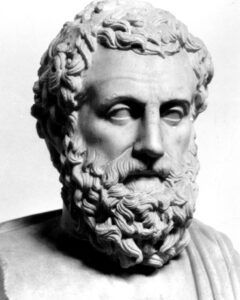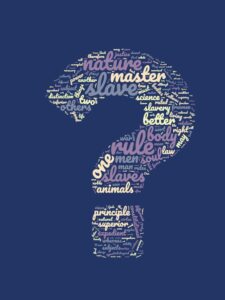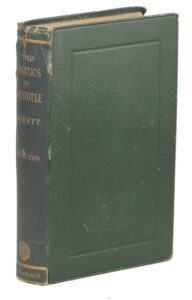But is there any one thus intended by nature to be a slave, and for whom such a condition is expedient and right, or rather is not all slavery a violation of nature?
INTRODUCTION

Aristotle (384 – 322 BCE) was one of a trio of philosophers and teachers in Ancient Greece (along with Socrates and Plato) who helped shape the foundations of Western thought. He arrived in Athens from Northern Greece as an orphaned teenager to study under Plato who himself had earlier studied under Socrates. Later as a teacher on his own, Aristotle helped tutor the young Alexander the Great. He wrote several classic texts in philosophy and ethics, including perhaps his most famous work, Politics (350 BCE). This excerpt from Book One of Politics features a discussion of the different types of slavery –slavery “by law” and also “by nature,” and illustrates how justifications for the total rule of some humans over others struck Aristotle as sometimes complicated but not necessarily immoral. Understanding such arguments from the very foundations of Western thought is essential as background for students who are studying how the fight over slavery’s morality evolved.
SOURCE FORMAT: Translated Manuscript (excerpt)
WORD COUNT: 1,305 words
Excerpt from Aristotle’s Politics, read and produced by Charlotte Goodman, ’23:
Book One, Part V
But is there any one thus intended by nature to be a slave, and for whom such a condition is expedient and right, or rather is not all slavery a violation of nature?
There is no difficulty in answering this question, on grounds both of reason and of fact. For that some should rule and others be ruled is a thing not only necessary, but expedient; from the hour of their birth, some are marked out for subjection, others for rule.

And there are many kinds both of rulers and subjects (and that rule is the better which is exercised over better subjects- for example, to rule over men is better than to rule over wild beasts; for the work is better which is executed by better workmen, and where one man rules and another is ruled, they may be said to have a work); for in all things which form a composite whole and which are made up of parts, whether continuous or discrete, a distinction between the ruling and the subject element comes to fight. Such a duality exists in living creatures, but not in them only; it originates in the constitution of the universe; even in things which have no life there is a ruling principle, as in a musical mode. But we are wandering from the subject. We will therefore restrict ourselves to the living creature, which, in the first place, consists of soul and body: and of these two, the one is by nature the ruler, and the other the subject. But then we must look for the intentions of nature in things which retain their nature, and not in things which are corrupted. And therefore we must study the man who is in the most perfect state both of body and soul, for in him we shall see the true relation of the two; although in bad or corrupted natures the body will often appear to rule over the soul, because they are in an evil and unnatural condition. At all events we may firstly observe in living creatures both a despotical and a constitutional rule; for the soul rules the body with a despotical rule, whereas the intellect rules the appetites with a constitutional and royal rule. And it is clear that the rule of the soul over the body, and of the mind and the rational element over the passionate, is natural and expedient; whereas the equality of the two or the rule of the inferior is always hurtful. The same holds good of animals in relation to men; for tame animals have a better nature than wild, and all tame animals are better off when they are ruled by man; for then they are preserved. Again, the male is by nature superior, and the female inferior; and the one rules, and the other is ruled; this principle, of necessity, extends to all mankind.
Where then there is such a difference as that between soul and body, or between men and animals (as in the case of those whose business is to use their body, and who can do nothing better), the lower sort are by nature slaves, and it is better for them as for all inferiors that they should be under the rule of a master. For he who can be, and therefore is, another’s and he who participates in rational principle enough to apprehend, but not to have, such a principle, is a slave by nature. Whereas the lower animals cannot even apprehend a principle; they obey their instincts. And indeed the use made of slaves and of tame animals is not very different; for both with their bodies minister to the needs of life. Nature would like to distinguish between the bodies of freemen and slaves, making the one strong for servile labor, the other upright, and although useless for such services, useful for political life in the arts both of war and peace. But the opposite often happens- that some have the souls and others have the bodies of freemen. And doubtless if men differed from one another in the mere forms of their bodies as much as the statues of the Gods do from men, all would acknowledge that the inferior class should be slaves of the superior. And if this is true of the body, how much more just that a similar distinction should exist in the soul? but the beauty of the body is seen, whereas the beauty of the soul is not seen. It is clear, then, that some men are by nature free, and others slaves, and that for these latter slavery is both expedient and right.
Book One, Part VI

But that those who take the opposite view have in a certain way right on their side, may be easily seen. For the words slavery and slave are used in two senses. There is a slave or slavery by law as well as by nature. The law of which I speak is a sort of convention- the law by which whatever is taken in war is supposed to belong to the victors. But this right many jurists impeach, as they would an orator who brought forward an unconstitutional measure: they detest the notion that, because one man has the power of doing violence and is superior in brute strength, another shall be his slave and subject. Even among philosophers there is a difference of opinion. The origin of the dispute, and what makes the views invade each other’s territory, is as follows: in some sense virtue, when furnished with means, has actually the greatest power of exercising force; and as superior power is only found where there is superior excellence of some kind, power seems to imply virtue, and the dispute to be simply one about justice (for it is due to one party identifying justice with goodwill while the other identifies it with the mere rule of the stronger). If these views are thus set out separately, the other views have no force or plausibility against the view that the superior in virtue ought to rule, or be master. Others, clinging, as they think, simply to a principle of justice (for law and custom are a sort of justice), assume that slavery in accordance with the custom of war is justified by law, but at the same moment they deny this. For what if the cause of the war be unjust? And again, no one would ever say he is a slave who is unworthy to be a slave. Were this the case, men of the highest rank would be slaves and the children of slaves if they or their parents chance to have been taken captive and sold. Wherefore Hellenes do not like to call Hellenes slaves, but confine the term to barbarians. Yet, in using this language, they really mean the natural slave of whom we spoke at first; for it must be admitted that some are slaves everywhere, others nowhere. The same principle applies to nobility. Hellenes regard themselves as noble everywhere, and not only in their own country, but they deem the barbarians noble only when at home, thereby implying that there are two sorts of nobility and freedom, the one absolute, the other relative. The Helen of Theodectes says:
“Who would presume to call me servant who am on both sides sprung from the stem of the Gods? ”
What does this mean but that they distinguish freedom and slavery, noble and humble birth, by the two principles of good and evil? They think that as men and animals beget men and animals, so from good men a good man springs. But this is what nature, though she may intend it, cannot always accomplish.
CITATION: Aristotle, Politics (350 BCE), Book One, Parts V-VII, translated by Benjamin Jowett and available FULL TEXT via MIT
DISCUSSION QUESTIONS
- When Aristotle labeled slavery as “natural and expedient,” did he mean that it was good or just an inevitable part of human existence? (Charlotte Goodman, ’23)
- Aristotle described different types of slavery but did not mention race. Was slavery in Ancient Greece different from slavery in the United States? (Jordyn Ney, ’23)
- Aristotle wrote that the “rule … of the mind and the rational element over the passionate” was both “natural and expedient.” Then why do so many of us today prefer leaders who are more passionate than rational? (Nick Rickert, ’23)
FURTHER READING
There is more ambiguity in this excerpt than appears at first –something made even more obvious to me after reading the competing views of scholars Agnes Callard and Stephen Smith. –Jordyn Ney
Lecture from Prof. Gregory Sadler
- FEATURED DATABASE: Dickinson College Commentaries (DCC)
- Agnes Callard, “Should We Cancel Aristotle? New York Times, July 21, 2020
- Stephen B. Smith, “What Did Aristotle Think About Slavery? Why We Need to Read Great Books Closely,” Public Seminar (The New School), August 27, 2020
- STUDENT CLOSE READING: By Jordyn Ney (’23)
- Handout –Aristotle
